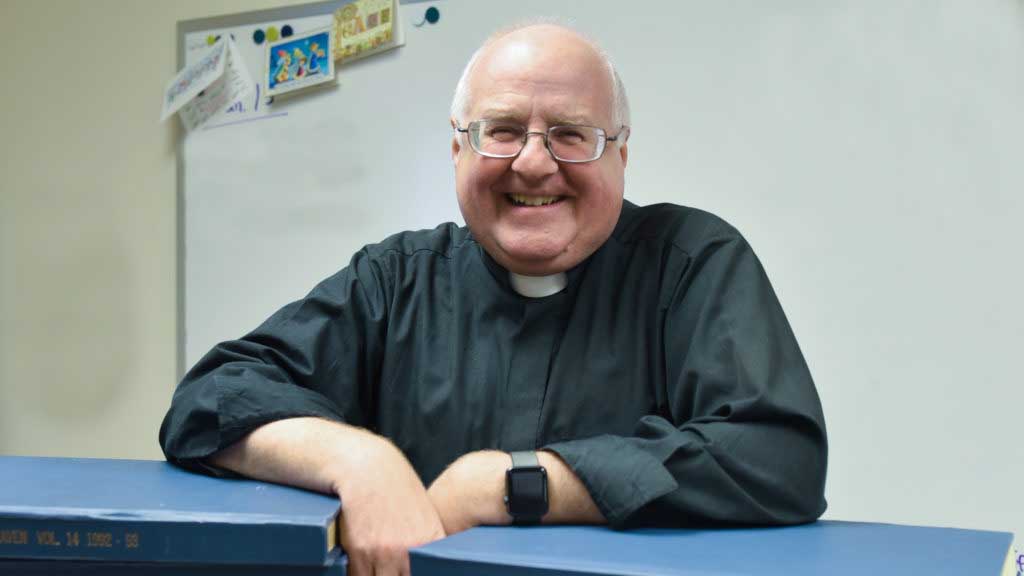
by Father Mark Goldasich
February always seems longer than it actually is. Perhaps that’s because it’s in the middle of dreary winter weather and often, though not this year, signals the beginning of the season of Lent.
One thing I always looked forward to as a kid, though, was the feast day of St. Blaise on Feb. 3, when the priest would bless throats. I did have to psych myself up, though, because having those crossed candles touch my throat always triggered a ticklish response. It was comforting to know that the church added this extra blessing and help to our lives, especially at the peak of cold and flu season.
I’m sure that you’re familiar with the story of St. Blaise, who was a physician, bishop and martyr. Although he died around the year 316, it wasn’t until the fifth or sixth century that a written reference surfaced about him healing a boy who was choking on a fish bone. Of course, that’s why he’s the patron of those battling illness of the throat.
Maybe not so well known is that St. Blaise was part of the Fourteen Holy Helpers, saints invoked in the fourteenth century for deliverance from the plague and other illnesses. The 13 additional Holy Helpers were George, Erasmus, Pantaleon, Vitus, Christopher, Denis, Cyriacus, Acacius, Eustace, Giles, Margaret, Barbara and Catherine. These saints were called upon for relief from headaches, epilepsy, palsy, stomach pains, toothache, eye and kidney diseases, and even fire and lightning storms.
But I digress. Let’s get back to good old St. Blaise. Would that we could bless the throats of everyone in the world, asking for the saint’s intercession to cure the rancor, hurt and divisiveness that come from the hurtful words that we sling at one another, especially those we disagree with. We need to pray for a spirit of gentleness, especially in the words we speak.
The thing that will truly change our hearts and the heart of the world is captured in this story:
A great bar of iron lay in a workshop. “I can break that easily,” said the axe, and showered blow upon blow upon its surface. But it was harder than he thought, and he made very little impression.
“You’re trying the wrong way,” said the saw. “Let me manage it.” She set to work backwards and forwards across the iron. But it was very strong and remained very much the same as before.
“I know how to break it,” said the hammer. “Get out of my way. I’ll do it!” Down it came with such a swing that its head flew off with the blow. But the iron remained unmoved.
A little flame was burning from a jet in the workshop. “May I try?” she said in a quiet voice. The louder voices ridiculed her, but the flame rose gently and curled herself around the iron bar. Without noise or force, the iron bar gradually melted and fell into two. (Story adapted from “More Quips, Quotes & Anecdotes for Preachers and Teachers,” by Anthony Castle.)
How many times do we speak harshly to one another, much like the axe, saw and hammer above? How often do we raise our voices in anger or frustration? In instances when we fly off the handle, what good is accomplished?
In this month when many people’s attention turns toward love, we should remember the power of that little flame. Approaching others with gentleness and humility, without noise or force — that is, with genuine love and concern — can melt away differences.
It starts not only with the words that we use, but the tone in which we speak them. And that’s why we need the blessing and help of St. Blaise, to accomplish what is practically impossible to do on our own.
In addition to examining how we speak to others, it’s important to reflect on our “self-talk.” Do we ever think the best of ourselves or are we constantly berating ourselves over our failures? If we don’t speak with compassion to our own selves, it’s no wonder we have problems speaking gently to others.
As we remember the touch of those crossed candles on our throats, may St. Blaise “tickle” us especially during this month to speak words of gentleness, joy and love . . . both to others and to ourselves.

